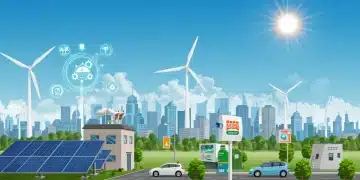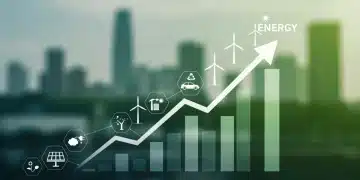Climate policy changes impacting the global economy

Climate policy changes impacting the global economy involve a shift toward sustainability, influencing investments, job markets, and international collaborations to combat climate change effectively.
Climate policy changes impacting the global economy are essential discussions in today’s world. Have you noticed how these policies can ripple through markets and influence everyday life? Let’s dive into their significance.
Understanding climate policy changes
Understanding climate policy changes is crucial in today’s context of rapid environmental shifts. These changes have a significant impact on both local and global economies. By adapting our policies, we can better manage resources, enhance sustainability, and drive economic growth.
The Importance of Climate Policies
Strong climate policies play a huge role in shaping economies. They encourage businesses to invest in renewable energy and sustainable practices. Furthermore, these policies can create new job opportunities in green sectors, promoting economic resilience.
Key Areas Affected
- Energy Production: Shifts to renewable sources like solar and wind are central to reducing emissions.
- Transportation: Policies promoting electric vehicles can reduce fossil fuel dependency.
- Agriculture: Sustainable farming practices can lead to better yields and reduced environmental impact.
Additionally, the implementation of carbon pricing can create financial incentives for businesses to lower their carbon footprint. Understanding how these policies work is essential for consumers too, as they influence everything from energy bills to local job markets.
By recognizing these changes, individuals can make informed decisions and support initiatives that promote a healthier planet. It’s not just about policy; it’s about building a sustainable future for generations to come.
Economic impacts of climate initiatives

Economic impacts of climate initiatives are becoming more apparent as governments and organizations strive to combat climate change. These initiatives can reshape entire industries, influence job markets, and alter consumer behavior.
Shifting Job Opportunities
As economies move towards greener practices, new job opportunities arise. For instance, jobs in renewable energy sectors, like wind and solar power, are growing rapidly. These sectors not only provide jobs but also help to lower overall carbon emissions.
Investment Trends
- Green Infrastructure: Investments in eco-friendly infrastructure are vital for sustainable growth.
- Research and Development: Funding for innovative technologies aims at reducing environmental footprints.
- Carbon Credits: Market systems for carbon trading promote investments in sustainability.
Economic shifts can also affect traditional industries. Sectors like coal and oil may see job losses as demand decreases. However, investing in retraining programs can assist workers in transitioning to green jobs. This not only helps the economy but also supports communities facing job displacement.
Furthermore, consumer choices are increasingly driven by sustainability. People are looking for eco-friendly products, which compels businesses to adapt. Companies that focus on sustainable practices can enhance their brand reputation and attract more customers. Thus, the economic impacts of such initiatives are multifaceted, driving change across several areas.
Investments shifting due to climate policies
Investments shifting due to climate policies reflect a growing emphasis on sustainability. As governments implement stricter regulations, businesses are adapting by reallocating resources toward greener solutions. This transition is creating waves across various sectors.
Financial Reallocation
Investors are increasingly drawn to companies that prioritize sustainable practices. This shift in focus is evident in the rise of green bonds and sustainable funds. These financial instruments not only support eco-friendly initiatives but also appeal to environmentally conscious investors.
Emergence of Green Technologies
- Renewable Energy: Solar, wind, and other renewable energies are attracting massive investments.
- Energy Efficiency: Innovations aimed at reducing energy consumption are gaining traction.
- Sustainable Agriculture: Investments in technologies that promote sustainable farming can enhance food security.
Beyond renewable energy, sectors like electric vehicles (EV) are booming as manufacturers pivot towards cleaner alternatives. Government incentives also bolster these sectors, encouraging manufacturers to explore electric options. This changing landscape creates numerous opportunities for investors.
Investors must remain vigilant and informed about these shifts. Understanding the evolving policies can aid in making judicious investment choices. The ongoing transition reflects a broader acknowledgment of the need for sustainable development.
Future trends in global economic policies

Future trends in global economic policies will increasingly prioritize sustainability and climate resilience. As climate change intensifies, countries are adapting their economic frameworks to address these challenges. Policymakers recognize that sustainable development is essential for long-term growth.
Emphasis on Green Economies
A shift towards green economies signifies significant changes in how nations approach growth. Investments in renewable energy, sustainable agriculture, and eco-friendly technologies will dominate future trends. Governments are likely to incentivize businesses that adopt sustainable practices, promoting a circular economy.
International Collaborations
- Trade Agreements: New trade agreements will focus on environmental standards.
- Climate Agreements: Nations will collaborate on initiatives to meet climate targets.
- Shared Technologies: Countries will share innovations in green technology to combat climate change.
This collaborative approach is vital for addressing global issues. Furthermore, countries will increasingly incorporate social equity into economic policies, ensuring that vulnerable communities benefit from sustainable initiatives. As businesses embrace corporate social responsibility, the focus will expand beyond profits to include social impacts.
The rise of digital currencies also represents a future trend in economic policies. These currencies could enhance transaction efficiency and provide an alternative to traditional banking systems. Policymakers will have to establish regulations to ensure their stability and security.
The future of global economic policies will greatly depend on our commitment to sustainability and collaborative initiatives. As we adapt to climate challenges, it’s essential to embrace green technologies and invest in renewable resources. Through cooperation and innovative thinking, we can pave the way for a resilient economy that benefits all. 🌍 Let’s work together for a sustainable future where everyone thrives!
FAQ – Frequently Asked Questions about Climate Policy and the Global Economy
What are the main objectives of climate policies?
The main objectives of climate policies are to reduce greenhouse gas emissions, promote renewable energy, and encourage sustainable development.
How do climate initiatives affect job markets?
Climate initiatives can create new job opportunities in green sectors while potentially displacing jobs in traditional industries like fossil fuels.
What is the role of international collaboration in climate policy?
International collaboration is vital for sharing resources, technologies, and best practices to effectively tackle climate change on a global scale.
How can businesses benefit from investing in sustainability?
Investing in sustainability can enhance a company’s reputation, attract eco-conscious consumers, and lead to long-term cost savings through efficiency gains.





